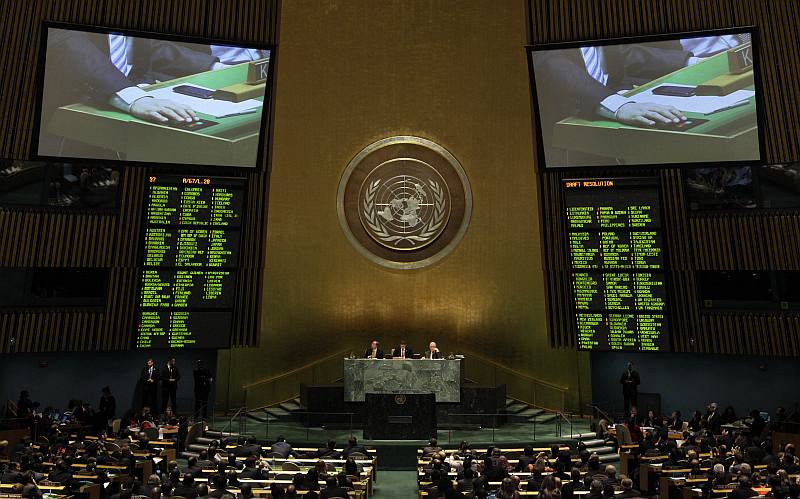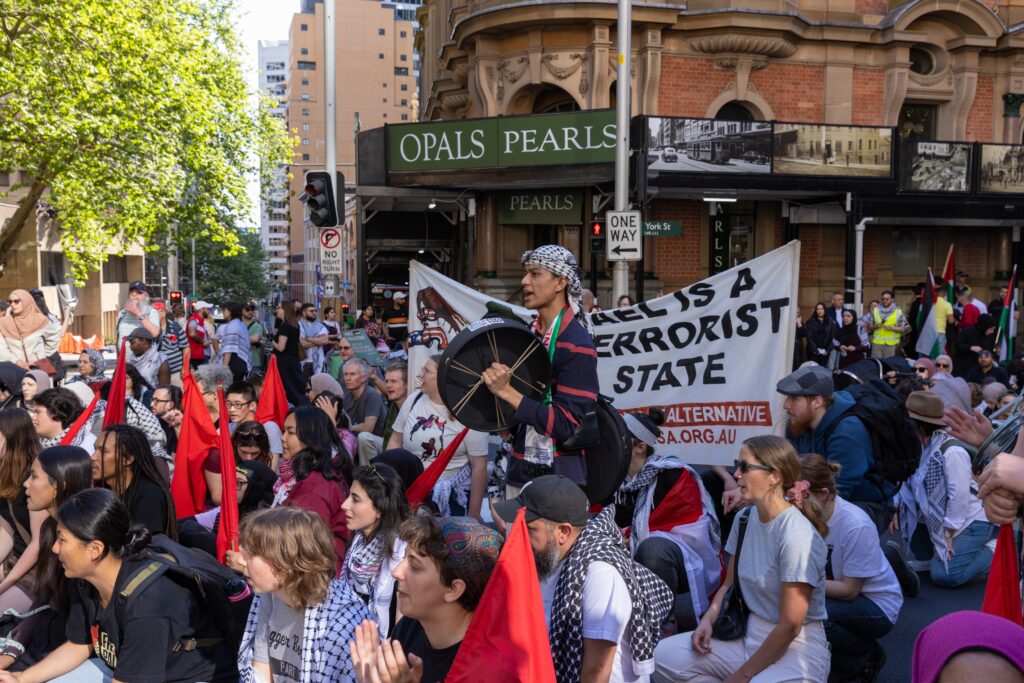IN THE MEDIA
Behind the ‘Palestine’ vote, a paradox
December 6, 2012 | Ahron Shapiro

Ahron Shapiro
Australian Jewish News – 6 December 2012
In order to fully understand all the implications of the upgrade of Palestinian status to non-member observer state at the United Nations, it is worthwhile to begin by revisiting their more ambitious first attempt to bring Palestinian UN membership to a vote in the United Nations Security Council last year.
At the time, Palestinian Authority President Mahmoud Abbas rejected the notion of bringing a resolution to the General Assembly naming “Palestine” a “non-member state” as too weak a gesture – not worth the damage such a move would cause the PA, especially regarding US aid.
What changed his mind were two things. First, his UNSC bid failed miserably. While Abbas was hoping to, at the very least, force the US to use its veto to stop the measure, it turned out he could not even marshal enough support to get that far.
Second, back in April, the International Criminal Court rejected a Palestinian request to prosecute Israelis for war crimes allegations stemming from the 2009 Gaza war on the grounds that the non-state status of the Palestinians precluded them from bringing cases before the ICC. In doing so, however, the body helpfully offered the petitioners a suggestion about how they could get around this problem.
The ICC’s reply to the Palestinian petitioners read: “In instances where it is controversial or unclear whether an applicant constitutes a ‘State’, it is the practice of the Secretary‐General to follow or seek the General Assembly’s directives on the matter.”
In other words, despite the fact that the UNGA has no power to bestow statehood on any country, the ICC appeared to indicate that nevertheless the UNGA’s word would be good enough for them.
Suddenly in Ramallah, the prospect of getting their status upgraded through the UNGA became much more appealing.
Fast forward to Thursday’s vote in the General Assembly. The surprise, of course, was not that the resolution passed. That was a foregone conclusion due to the automatic majority the Palestinians enjoy for their resolutions in that forum. It’s worth noting that the 138 ‘yea’ votes for the upgrade matched very closely the number of countries that had previously recognised “Palestine” as a state.
What was unexpected about the outcome – and disappointing for Israel and embarrassing for the United States – was that so many countries chose to abstain, including Australia and much of Europe outside of the Czech Republic. Even worse, New Zealand and some European countries actually went further and voted for the resolution.
How did the Palestinians manage to convince so many Western countries to support the resolution, whether explicitly or implicitly?
Part of the answer lies in the diplomatic success the Palestinians have had in portraying the continued Israeli construction within West Bank settlements and east Jerusalem as something worth punishing Israel over.
The Palestinians argued effectively that voting “no” on the resolution to upgrade would be rewarding Israeli “intransigence” on the settlement issue – effectively concealing the long-standing fact that in negotiations, Palestinian negotiators have indeed accepted that some Israeli settlements will remain in any peace agreement, while Israel already has in place policies which prevent either the construction of new settlements or the territorial expansion of existing settlements.
Many also bought into the Palestinian argument that voting for the resolution would “strengthen the moderates” – a euphemism for propping up the Palestinian Authority which became a mantra for Western diplomats after the recent flare-up in rocket attacks from Hamas in Gaza.
The main reason for the abundance of abstentions, however, was mooted to be the discrete promises made to many countries – the UK said to be among them – that, in exchange for abstaining on the resolution, the Palestinians would agree to return to the peace table immediately and agree not to use the upgrade to bring Israelis before the ICC.
Meanwhile, the Palestinian people have not been tuned in to these promises. They are fully expecting their leadership to use this upgrade to prosecute Israelis in the ICC, to vastly increase international pressure against settlements and force Israel to accept uncompromising Palestinian terms in negotiations.
A large number of Palestinian officials have pandered to this sentiment. This accounts for Hamas’ eventual support for the resolution as well.
Abbas needed the abstentions to get international legitimacy for the Palestinian upgrade – legitimacy that would only be required for controversial actions like turning to the ICC.
But in order to get those abstentions, they had to give assurances that the upgrade would only be symbolic.
This paradox sets the stage for massive disappointment on one side or the other. Abbas cannot satisfy the expectations of the international community without upsetting the Palestinian street, and vice versa.
Abbas’ saving grace is that the international community has a short memory about broken Palestinian promises and has historically demonstrated an almost limitless capacity to forgive Palestinian acts of hostility against Israel, whether manifest in “lawfare” – the growing Palestinian quasi-legal attacks against Israel in order to delegitimise it – in racist incitement or in actual physical violence.
Yet while the collective memory of the international community is short, it’s hardly non-existent. Those countries who were promised a revival of good-faith final status peace negotiations between the Palestinians and Israel in return for their abstention should now expect Abbas to make good on his promise, and soon.
Ahron Shapiro is a policy analyst for the Australia/Israel & Jewish Affairs Council.
Tags:





